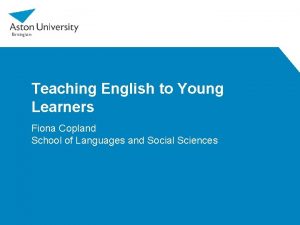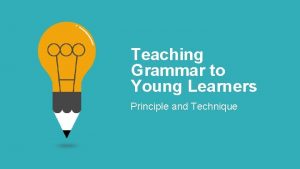The Challenge of Teaching English to Adult Learners

- Slides: 1

The Challenge of Teaching English to Adult Learners in Today's World Mihaela Cozmaa Department of English Language, West University of Timişoara, Bd. V. Pârvan 4, Timișoara 300223, Romania Introduction The general perception regarding the traditional target audience of foreign language teaching is that it is normally represented by various types of young learners, ranging from children, to adolescents and, sometimes, to very young adults. Consequently, when the language students’ position is occupied by adult learners, the teaching process is considered to be more problematic. Today, maybe more than ever before, this view is supported by parents , educators and policymakers, who, in their effort to prepare children for a multilingual future, put forward the concept of “the earlier the better” when it comes to learning a foreign language. But is it really true that the older the students are, the more ineffective they are as language learners? Even if not all methodologists share this opinion, there seems to be a general consensus that the learners’ age is associated with specific needs, competences and cognitive skills, which, in their turn, involve characteristic teaching and learning patterns. This paper will discuss the special features presented by the adult students, will identify the challenges that might occur when working with this category of students, and, then, will consider some methodological implications for the process of teaching English to mature learners. Attitudinal characteristics It is widely agreed that motivation represents a factor of central importance for successful learning. Unlike younger learners, the adult learners are usually highly motivated from the very beginning of the instruction process, and this makes it much easier for the teacher to perform his/ her task as a motivator. Moreover, as Harmer (2007) points out, “many adults are able to sustain a level of motivation by holding on to a distant goal in a way that teenagers find more difficult” (p. 84). Adults are certainly more cooperative learners, and the mature age students have more learning experience behind them, and this aspect can prove to be both beneficial and problematic. Thus, on the one hand, adult students have well-developed learning strategies. On the other hand, adults come to the English classroom with certain expectations about the learning process, and, in case these expectations are not met, the learners may become critical towards the new context of instruction. There also situations when adults are less confident in their intellectual abilities. Behavioral characteristics In comparison to other age groups, adults tend to be more disciplined and more willing to struggle on despite boredom (Harmer, 2007, p. 84). Teachers of adults are less likely to have to deal with the ongoing daily discipline problems that generally occur with younger students. They take the instructional process seriously Challenges Review Although the concept of “adult learners” may be given slightly differing definition, in my approach this term refers to persons over the normal age of traditional schooling ( over 23 -25 years old), who freely choose to get involved in a particular form of instruction, in order to serve a professional, social or personal need or interest. As I have already anticipated, in the field of the teaching methodology, the interest in adult learners emerged from the idea that mature students learn somehow differently from the young ones. Cognitive characteristics A common myth in the field of education is that adult students are generally more ineffective as language learners than the traditional students, on the account that the younger people are, the more flexible their brains, and, consequently, the better their cognitive functions. However, research seems to challenge this myth, indicating that, indeed, younger students may be better when it comes to acquiring pronunciation, but, otherwise, adults are perfectly able to reach high levels of proficiency in a foreign language (Lightbown & Spada, 2006, p. 73). Moreover, methodologists (e. g. Harmer, 2007, p. 81) stress that adult learners have greater cognitive capabilities and conceptual complexity than the younger ones. The general characteristics presented by the adult learners might make people consider that it is easier to teach English to more mature students than to children, Physical and cognitive factors due to the adult learners’ specific physical and cognitive characteristics adult learners require more attention. Thus, because of their lower energy level, as well as their multiple responsibilities, the adults generally come to the English classroom with a certain level of fatigue. But the mature learners are characterized by greater cognitive abilities and conceptual complexity, my subjects note the fact that memory and reaction time is sometimes slower in the case of this type of students. 3. 2. Attitudinal factors the mature learners’ instructional process is generally supported by a high level of motivation, but this motivation is also accompanied by these students’ high expectations with regard to their instruction. methodological considerations 4. 1. Task choice and achievement The adult learners’ greater cognitive capabilities and conceptual complexity should represent an advantage for the English teacher. Adults come into the English classroom with a rich range of experiences – regarding not only learning, but also life in general. The learning tasks must be practical, must have a clear purpose, and must be relevant to important issues in the adults’ lives 4. 2. Use of modern technology an important role for the teacher of adult learners is that of preparing them to use the technology in a non -threatening context meant to foster positive attitudes in adults towards both technology and learning. 4. 3. The affective climate of the classroom Adults may experience difficulties adjusting to various elements of the learning context, from the general instructional setting, to the teaching methods, or even the study skills. adults frequently feel rather insecure in their position as students, teachers should provide support and encouragement when asking them to take risks or try new skills. Moreover, adults tend to take errors personally and are more likely to let them affect their self-esteem. Conclussion It seems that, in spite of the difficulties that might occur, the process of teaching English to adult learners can prove to be very interesting and, at the same time, rewarding. These learners’ motivation, determination and life experience can bring a wide range of benefits to the context of instruction. However, it is obvious that instructors must be more flexible and more responsive in adult educational contexts. It is only in this way that teachers can really contribute to the success of their students’ learning by creating a positive climate which makes adults feel emotionally safe, and which offers them the type of instruction that they expect. Bibliography Brookfield, S. D. (1990). The skillful teacher. San Francisco: Jossey-Bass. Conlan, J. , Grabowski, S. , & Smith, K. (2003). Adult learning. In M. Orey (Ed. ), Emerging perspectives on learning, teaching, and technology. Retrieved from http: //projects. coe. uga. edu/epltt/index. php? title=Adult_Learning. Frențiu, L. , & Cozma, M. (2013). Preparing adults for professional English examinations. In F. Szabo (Ed. ), International conference on vocational and adult education. “Gyula Juhasz” Faculty of Education, University of Szeged (pp. 66 -81). Szeged: SZTE JGYPK. Harmer, J. (2002). How to teach English. Malaysia: Longman. Harmer, J. (2007). The practice of English language teacher (4 th ed. ). Harlow: Longman. Knowles, M. et al. (1984). Andragogy in action. Applying modern principles of adult education. San Francisco: Jossey Bass. Lightbown, P. , & Spada, N. (2006). How languages are learned. Oxford: Oxford University Press. Merriam, S. B. , Caffarella, R. S. , & Baumgartner, L. M. (2007). Learning in adulthood: a comprehensive guide (3 rd ed. ). San Francisco: Jossey. Bass. Polson, C. J. (1993). Teaching adult students (IDEA Paper No. 29). Manhattan, KS: Center for Faculty Evaluation & Development, Division of Continuing Education, Kansas State University. Retrieved from http: //ideaedu. org/sites/default/files/Idea_Paper_29. pdf Sharma, P. L. (2006). The future of the learning world. New Delhi: Sarup & Sons.

